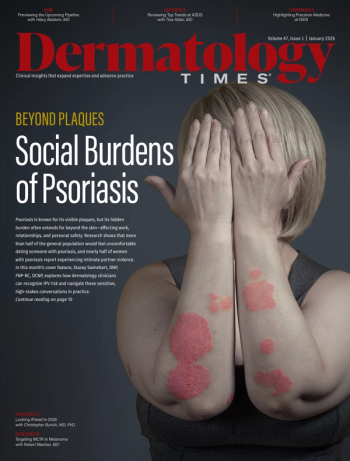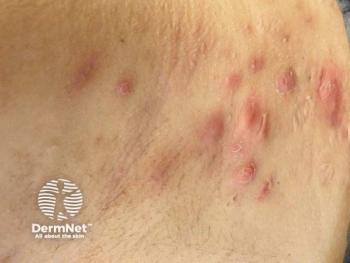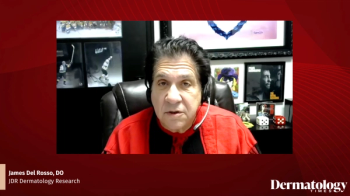
Consensus, Concern, and Commentary: Clinicians Share Thoughts on 'The BPO Bombshell'
We spoke with several dermatology experts to gauge their thoughts on Valisure's recent findings of benzene in benzoyl peroxide products--as well as what actions they plan to take moving forward.
The "BPO bombshell," as named by dermatology physician assistant Shanna Miranti, MPAS, PA-C, dropped just days before the American Academy of Dermatology Annual Meeting in San Diego, California.
In the time since, dermatology clinicians have taken to social media and extensively discussed the topic with their colleagues. What has transpired has been a collective sense of unease--whether with BPO-containing products or Valisure's findings.
Dermatology Times recently spoke with trusted dermatologists and physician assistants and asked them to share their insights and impressions on the findings, including what actions they are encouraging their patients to take in the days to come.
Below, we highlight insights from Adewole (Ade) Adamson, MD, MPP; John Barbieri, MD, MBA, FAAD; Renata Block, MMS, PA-C; Christopher Bunick, MD, PhD; Zoe Diana Draelos, MD; Henry Lim, MD; Shanna Miranti, MPAS, PA-C; and Dustin Portela, DO.
Adewole (Ade) Adamson, MD, MPP
Board-Certified Dermatologist (Austin, TX)
Assistant Professor of Internal Medicine (Division of Dermatology), Dell Medical School at the University of Texas at Austin
Health Services Researcher
"The findings from Valisure need to be put in proper context. The investigators tested the breakdown of benzoyl peroxide to benzene at various temperatures (including body heat) but only showed data for temperatures that are unrealistically high for the way most people store their benzoyl peroxide products. While the findings should be noted, further testing under normal circumstances is required before even suggesting that benzoyl peroxide is unsafe and requires removal from drug store shelves. Bottom line, Valisure has not demonstrated that benzoyl peroxide is unsafe for patients."
John Barbieri, MD, MBA, FAAD
Board-Certified Dermatologist (Boston, MA)
Director, Advanced Therapeutics Acne Clinic, Brigham and Women's Hospital
Assistant Professor of Dermatology, Harvard Medical School
"This is an important issue that warrants our attention. We certainly do not want acne patients being exposed to benzene from benzoyl peroxide and should work to develop techniques to better stabilize this important ingredient for acne care. However, we also need to see more data about potential benzene formation under more routine storage conditions, such as room temperature or refrigerated. It is unfortunate that Valisure did not include detailed data about these important questions in the report. It is possible that we can continue to use benzoyl peroxide safely if stored appropriately and not kept for long periods of time. We also must keep in mind that if we stop using benzoyl peroxide, we will be forced to instead use other treatments that might have their own potential risks, such as oral antibiotics or isotretinoin."
Renata Block, MMS, PA-C
Board-Certified Physician Assistant (Munster, IN)
PA, SKIN Dermatology
Member, Dermatology Times Editorial Advisory Board
"As someone who has always loved chemistry and research, I understand the reasoning behind the testing, which concerns the safety of the products throughout their lifecycle. However, I have many questions about the testing. I would like more details. Why were these products chosen? Why are products releasing different amounts of benzene (i.e., is there a standard of how stable benzoyl peroxide has to be before it is packaged)? What are the safety requirements for transportation (aka the hot car) and storage of these products before they reach the consumer? Does the packaging matter, or where are they manufactured? What were the levels of benzene before Valisure incubated the products? Finally, who is funding the testing and why? Suppose the results are credible, as they have been with other products tested by the facility. We will need a significant overhaul of the safety of manufacturing, distribution, and quality control of all products on the market.
Unfortunately, many rumors are being propagated instead of facts, which is disturbing as people are misinformed and misguided. Speculation about the 'why' Valisure even did the testing is surfacing among chemists, dermatologists, and the general public. It is for the safety of the consumer because, in the end, that is who is mainly affected. Many people are confused, worried, and wondering what to do. I have had numerous people reach out to me to obtain the list of products tested and what is recommended in place of these products. Another concern I have seen trending is that many more products and brands are on the market than the ones tested and how people should proceed with the products. Without giving any medical advice, I would suggest waiting to use the list of products until we get more information and a formal response from the FDA. In the meantime, other alternatives, such as OTC sulfur products, salicylic acid, and AHA, can be used. If people are concerned about flaring, I strongly suggest they make an appointment with their dermatology practitioner, who will help guide them and provide reassurance."
Christopher Bunick, MD, PhD
Board-Certified Dermatologist (New Haven, CT)
Associate Professor of Dermatology, Yale School of Medicine
Physician-Scientist, Yale School of Medicine
Dermatology Times Winter Editor in Chief
"I want to reiterate first and foremost that there is not a safe level of benzene that can exist in any skin care product, over the counter or prescription. Benzene is highly carcinogenic, and recently we've seen the US Food and Drug Administration agree with this position by taking action to ensure removal of carbomers contaminated with benzene from manufacturing processes.
Here, it is not contamination, rather benzoyl peroxide breaks down into benzene, stimulated to do so by the formulation of the products themselves. What is concerning is that nearly all benzoyl peroxide-containing products tested formed benzene (even the new triple combination topical), often at levels 2 to 1000X higher than the emergency/conditional FDA limit of 2 ppm. To make matters worse, benzoyl peroxide breakdown into benzene was accelerated by exposure to elevated temperatures equivalent to a hot bathroom or car, meaning that patients and consumers must be mindful of how to store their benzoyl peroxide-containing product (not in a car!). Even more concerning, as benzoyl peroxide breaks down into benzene, the gaseous form of benzene was found to penetrate through sealed packaging at levels nearly 1000X higher than EPA lifetime exposure limit (0.4 ppb) for the increased risk of 1 cancer per 100,000 people. Thus, benzoyl peroxide-containing acne products unsuspectedly are also an inhalation risk."
Zoe Diana Draelos, MD
Board-Certified Dermatologist (High Point, NC)
Consulting Professor Dermatology, Duke University School of Medicine in Durham
Dermatology Times Editor in Chief Emeritus
"This is a major issue for dermatology as BPO is one of our most effective acne drugs and has been used for years with great safety. It is well known that BPO is unstable and that it must be specially handled and packaged. I think it needs to be stated that prescription drugs or OTC drugs that contain BPO carry labeling noting how the product is to be properly stored for safety reasons. Subjecting BPO to temperatures above those recommended on the packaging is not appropriate. The current news stores questioning the safety of BPO under heated conditions outside the recommended range resulting in benzene production is not good science and should be disregarded."
Henry Lim, MD
Board-Certified Dermatologist (Detroit, MI)
Dermatologist, Henry Ford Hospital
Past President, American Academy of Dermatology
"Clearly this is something that needs to be investigated further. This is a new issue that we all have to deal with. To be cautious, probably one needs to tell our patients that the data is still in flux. If they are concerned, they can use other products.”
Shanna Miranti, MPAS, PA-C
Board-Certified Physician Assistant (Naples, FL)
PA, Riverchase Dermatology
Member, Dermatology Times Editorial Advisory Board
"In response to the BPO bombshell that was dropped just prior to the AAD this year, a lot as practicing dermatology APPs are seeking more information and guidance on how to now counsel our patients. It’s as if a very reputable source came out and told us that ‘exercise is bad for you’. We all innately know that exercise done the wrong way, or overdone could potentially lead to problems, but could it REALLY cause harm? The first rule of medicine is 'Do no harm!' and up until last week… BPO had a pretty good track record. Benzoyl peroxide is currently found in dozens of prescription medication‘s and probably hundreds of different OTC formulations.
Benzoyl peroxide has been used for skin conditions since the early 1900s. It is used in dentistry to whiten teeth, and at the beauty parlor to bleach hair. It’s even used to bleach flour (and fabrics!). It is even on the World Health Organization’s list of essential medications. In dermatology and infectious disease, we have been trained that the presence of benzoyl peroxide can reduce the risk of microbial resistance.
We are trained with evidence based medicine. So many of us now want to see the data. We want to know if benzene is present in these formulations or if the original organic BPO molecule was tested at unnaturally high temperatures and broke down into another chemical structure? How do we preserve this important medicine? Will cold-chain shipping to the pharmacy, and temperature controlled delivery to patients reduce the risk? How can we be sure that OTC formulations that patients are buying on their own have not been exposed to high temperatures? I’m sure I’m not the only provider that wants to know more!"
Dustin Portela, DO
Board-Certified Dermatologist (Boise, ID)
Dermatologic Surgeon, Treasure Valley Dermatology
"There are a few important points that I think consumers should understand about this benzene news. First off, I want to say that there is no safe level of benzene, and we should minimize our exposure to it as much as possible. I’ve spoken with a number of industry executives as well as cosmetic chemists over the past week to understand their perspective and the steps that these companies are taking to investigate the matter. In all of my conversations, it is clearly evident that each of these companies has consumer safety at the top of their mind. While they are doubtful about the claims made by Valisure pharmacy, they have initiated additional testing to see if the claims made by valisure are legitimate.
That being said, it is also important to understand that we are exposed to benzene frequently. Sitting idle in traffic, pumping gas into your car, sitting around a campfire, or inhaling secondhand smoke are all sources of benzene above the 2 ppm recommended as a limit by the FDA. Most of the cases where we see benzene as a primary cause of leukemia or other cancers were from case reports of industrial workers, exposed to very high levels of these chemicals. There are no documented cases of topical acne products leading to cancer. Benzoyl peroxide remains one of the most efficacious over-the-counter products to treat and prevent acne.
Valisure pharmacy has claimed to find benzene in many other personal care products, and in a number of these circumstances, additional independent testing has been unable to replicate their findings. Valisure pharmacy is not a registered laboratory with the FDA so they are not subject to good laboratory practice standards that the manufacturers of your personal care products are.
Some journalists have also discovered that it appears Valisure pharmacy has filed a patent for a unique formulation of benzoyl peroxide, which they claim cannot break down into benzene. So there is a potential conflict of interest if they were to attempt to get other formulations removed from the market so that theirs could become a top seller. Now, this potential conflict of interest does not mean that their findings are automatically inaccurate. However, if their findings would have been published in a peer reviewed journal, there would have been the opportunity for other labs to validate their methods and arrive at the same conclusions or refute their conclusions. They would have also been required to disclose such conflicts of interest. If they had gone through those channels rather than a citizen's petition to the FDA, I would be giving more weight to their claims at this point.
Every personal care product has to go through stability testing as well as additional testing for volatile organic compounds, including benzene. Had these compounds been discovered during manufacturing they would not be sold to the public. At this time, unless additional evidence becomes apparent, I am not recommending to my patients to avoid using their benzoyl peroxide products, and I have not personally stopped using mine either."
References
- Valisure citizen petition on benzene in benzoyl peroxide drug products. Valisure. March 5, 2024. Accessed March 19, 2024.
https://assets-global.website-files.com/6215052733f8bb8fea016220/65e8560962ed23f744902a7b_Valisure%20Citizen%20Petition%20on%20Benzene%20in%20Benzoyl%20Peroxide%20Drug%20Products.pdf - Valisure detects benzene in benzoyl peroxide. News release. Valisure. March 6, 2024. Accessed March 19, 2024.
https://www.valisure.com/valisure-newsroom/valisure-detects-benzene-in-benzoyl-peroxide
Newsletter
Like what you’re reading? Subscribe to Dermatology Times for weekly updates on therapies, innovations, and real-world practice tips.










